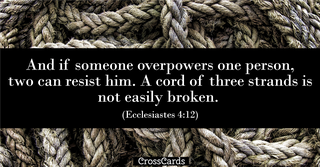
- Recent Translations
- All Translations
Ecclesiastes 4:6
Share
Settings
Images for Ecclesiastes 4:6

Ecclesiastes 4:6 Meaning and Commentary
Better [is] a handful [with] quietness
These are the words of the fool, according to Aben Ezra; and which is the sense of other interpreters, particularly Mr. Broughton, who connects this verse with ( Ecclesiastes 4:5 ) by adding at the end of that the word "saying"; making an excuse or an apology for himself and conduct, from the use and profitableness of his sloth; that little had with ease, and without toil and labour, is much better than both the hands full [with] travail and vexation of spirit;
than large possessions gotten with a great deal of trouble, and enjoyed with much vexation and uneasiness; in which he mistakes slothful ease for true quietness; calls honest labour and industry travail and vexation; and supposes that true contentment lies in the enjoyment of little, and cannot be had where there is much; whereas it is to be found in a good man in every state: or else these words express the true sentiments of Solomon's mind, steering between the two extremes of slothfulness, and too toilsome labour to be rich; that it is much more eligible to have a competency, though it is but small, with a good conscience, with tranquillity of mind, with the love and fear of God, and a contented heart, than to have a large estate, with great trouble and fatigue in getting and keeping it, especially with discontent and uneasiness; and this agrees with what the wise man says elsewhere, ( Proverbs 15:16 Proverbs 15:17 ) ( 17:1 ) . The Targum is,
``better to a man is a handful of food with quietness of soul, and without robbery and rapine, than two handfuls of food with robbery and rapine;''or with what is gotten in an ill way.